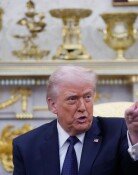[Editorial] Economic Revival to Decide Gov`t`s Honor
[Editorial] Economic Revival to Decide Gov`t`s Honor
Posted May. 27, 2008 08:53,
In the first five months of the year, more than 3,600 restaurants have gone out of business due to poor sales. Even those still in business are increasingly teetering on the verge of collapse in the face of skyrocketing commodity prices, such as those for flour. Groundless rumors that U.S. beef is prone to mad cow disease, along with the bird flu outbreak, have dealt a double blow to the self-employed, pushing them into abysmal despair. Many are screaming over consumer confidence hitting its lowest level since the Asian financial crisis of the late 1990s. This does not sound exaggerated. The downfall of independent enterprises has cost 319,000 jobs in the restaurant and hospitality industry over the past 15 months. The number of new jobs in April was 190,000, barely above half of the goal of 350,000 set by the Lee Myung-bak administration.
Surging prices have curbed consumer appetite for expensive goods and forced them to tighten their belts levels not seen in years. The Lee administration has selected 52 items for close price monitoring to help inflationary pressure, but no end is apparently in sight for relentless price hikes. Samsung Economic Research Institute said its survey on consumer confidence in the first quarter found that 99.1 percent of surveyed households felt inflations effects and that 41.4 percent will cut spending. When individual businesses collapse, employment slows and price hikes and consumption are reduced. These are pointing to a dangerous slowdown, with the overall economy grappling with a sloppy slope and the people bogged down by cash-strapped conditions. Now warnings say Korea must brace for a worst-case scenario of stagflation.
The chief policy-maker of the ruling Grand National Party, Lee Han-koo, warned yesterday, There is a threat of a serious price spiral within two or three months. If things remain the same, the livelihood of the people will sustain a great loss. On the bleak situation, even those within the presidential office have raised their voices against President Lee Myung-baks chief economic adviser Kim Jung-su, who is under fire for failing to fine-tune economic policies. The party and the administration are becoming targets of public outcry for failing to narrow gaps on supplementary budget, tax cuts and deregulation in the wake of the dramatic decline of the economy at home and abroad. High-ranking officials of the government and the ruling party should be held responsible for their failure to catch this policy opportunity.
The Lee administration came to power on its pledge to revive the economy, but has given nothing but lip service since its inauguration. President Lee should humbly know that his inability to carry out his pledge is the major reason for the nosedive in his approval ratings. He and his administration should recognize the seriousness and urgency of the situation Korea faces today, and make every effort to stabilize the livelihood of the people and revitalize the economy. President Lee, who will make a four-day visit to China, economic officials and the ruling and opposition parties need to join hands to tide over looming inflation and achieve price stabilization.







